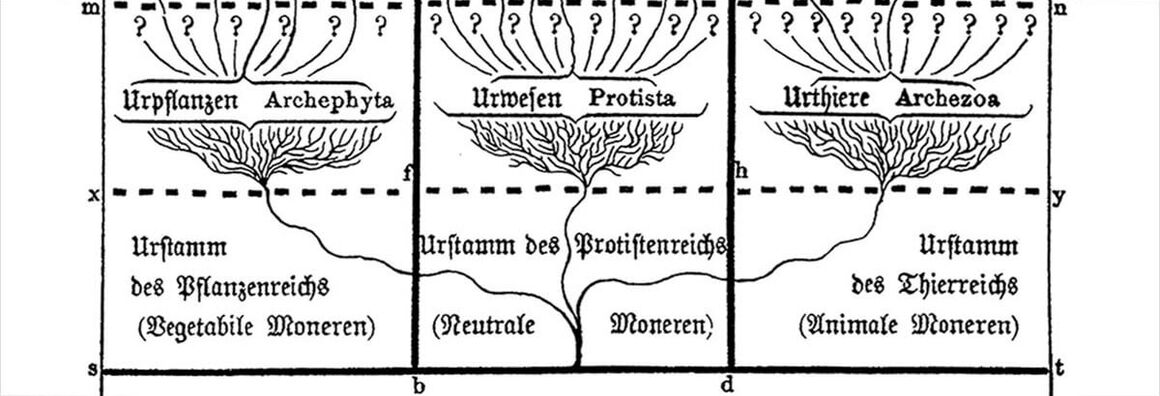
Aitiologies in the Reality Narratives of the Natural Sciences: On the Epistemic Function of Origin (Re)Constructions
This project is part of the DFG Research Unit “Aetiologies: Founding Narratives in Literary, Scholarly, and Scientific Discourses” that seeks to explore productive interdisciplinary uses for the concept of aitiology. It analyzes narratives of creation, literary and scientific primal scenes, as well as political foundation narratives with a specific focus on their respective rhetoric.
The two-part subproject housed at the ZfL explores the aitiological procedures implemented by the “historical natural sciences.” These describe and explain natural developments that reach far back in time, such as the succession of geological formations and forms of life in the history of the Earth. The project focusses on the significance of aitiological explanations for the natural sciences themselves and on their reception in the context of critical social theory. The guiding question is how the present is understood, explained, and criticized in the context of aitiological argumentations, especially through the construction and reconstruction of significant starting points of developments, the “origins.”
Fig. above: Einstämmiger oder monophyletischer Stammbaum der Organismen (detail), Source: Ernst Haeckel: Natürliche Schöpfungsgeschichte, Berlin: Gg. Reimer 1868, Taf. 1, 569
Website of the project: www.aitiologie.de
Subproject(s)
Concepts, Images, and Procedures of Aitiological Narratives in the Historical Natural Sciences
This subproject analyzes explanatory evolutionary narratives in the life sciences with regard to their concepts, images, procedures, and instrumentalizations as well as their epistemic functions and the fictional status of their origin constructions. The aim is to examine the empirical accessibility of the postulated origins, their fictional-hypothetical as well as their explanatory content, their narrative integration and explanatory scope. It will determine the specific nature of scientific aitiologies and their difference to cultural myths and ideologies. Thus, the subproject aims to explore the interplay of fictionality and facticity, construction and reconstruction, as well as narration and explanation in the historical natural sciences through the example of aitiologies. The main hypothesis is that the construction of an origin in the argumentations of the historical natural sciences has a similar function to the laws in the nomological natural sciences, namely to organize the manifold array of appearances and to unify.
Critical Recapitulations: Repeated Origins Between Evolutionary Biology and Marxist Theory
The assumption that the individual development repeats (“recapitulates”) the evolution of species influenced Marxist positions, from Friedrich Engels’ classical Marxism to the Critical Theory of the Frankfurt School of Herbert Marcuse and beyond. While the recapitulation theory’s problematic entanglements with colonial conceptions of time, racist psychology, and eugenics have been widely criticized in the history of science, its impact on critical social theories has barely been researched. Applying methods from philosophy, literary studies, and the history of knowledge, this dissertation project studies the changing transfers between evolutionary biology, psychoanalysis, and Marxism. In order to enable a self-reflexive examination of ambivalent theoretical legacies, it explores the following guiding questions:
How does the reception of recapitulation theory shape socio-critical analyses and programs? How do the narrative and rhetoric operations of recapitulation (such as repetitions, condensation, acceleration, parallelization, and synecdoche) dynamize the aitiologies of social and psychological forms in capitalist systems? What importance does the recapitulative relationalization of different developmental levels bear for post-Marxist diagnoses of the present, especially during the so-called Capitalocene?
Events
Jenseits des soziogenetischen Prinzips – Sylvia Wynter, Frantz Fanon und Entwicklungskritik
Helle Panke e.V. – Rosa-Luxemburg-Stiftung Berlin, Kopenhagener Str. 9, 10437 Berlin
Liola Mattheis: Arcades and embryos. Benjamin’s recapitulations
Université de Montréal, 2910 Édouard-Montpetit, Raum 422, Montréal, Kanada
Liola Mattheis: Observing Darwin observing
University of Amsterdam, Spui 21, 1012 WX Amsterdam
Georg Toepfer: Tracing Beginnings. How Archives of Nature are Used in Origin Stories
University of Vechta, Driverstraße 22, 49377 Vechta
Georg Toepfer: Aitiologien in den Wirklichkeitserzählungen der Naturwissenschaften: Zur epistemischen Funktion von Ursprungs(re)konstruktionen
Freie Universität Berlin, Rost- und Silberlaube, Hörsaal 2, Habelschwerdter Allee Alle 45, 14195 Berlin
Deep Time: (Durch) geologische Zeit erzählen und erklären
Freie Universität Berlin, Fabeckstraße 23–25 (Holzlaube), 14195 Berlin, Room 2.2051
Aitiologien: Figuren und Funktionen begründenden Erzählens in Wissenschaft und Literatur
Freie Universität Berlin, Fabeckstraße 23–25 (Holzlaube), 14195 Berlin, room 2.2058/59
Media Response
Conference report by Liola Mattheis and Liza Wyludda, in: H-Soz-Kult, 30 Nov 2024